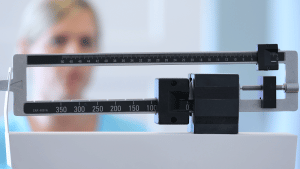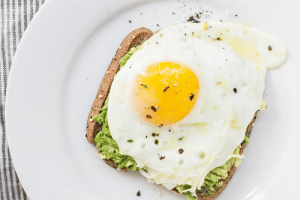For many, choosing a weight loss meal plan is a guessing game. With so many programs on the market all claiming to have the only real solution to your weight loss challenges, it can be tough to figure out which one is best for you. For others, the idea of endlessly counting calories, servings, and other measurements makes the prospect of diet plans seem hopelessly dismal.
 In the age of medical science, weight loss shouldn’t be a guessing game. There is a way to lose weight without feeling deprived or falling victim to trendy eating plans that could cause long-term damage to your health. Science-based nutrition plans are the key to losing fat while retaining muscle and energy. Look for these elements to ensure the weight loss meal plan you choose is more than just a fad.
In the age of medical science, weight loss shouldn’t be a guessing game. There is a way to lose weight without feeling deprived or falling victim to trendy eating plans that could cause long-term damage to your health. Science-based nutrition plans are the key to losing fat while retaining muscle and energy. Look for these elements to ensure the weight loss meal plan you choose is more than just a fad.
How Does Meal Planning Make Losing Weight Easier?
Before searching for a weight loss meal strategy, it’s important to understand what role this guidance plays in your journey towards optimal health.
Eating to lose weight is a deceptively simple idea. In theory, all it takes to shed excess weight is that you use more calories than you eat. By creating a calorie deficit, according to traditional wisdom, the body is forced to burn extra fat for energy.
 However, what you eat has a huge impact on your energy levels, mood, and metabolic processes. Besides what’s on your plate, mealtimes and frequency also affect your dieting results. Therefore, more than just a list of the things you should eat, an effective meal plan should also include information on when you eat, how to prepare foods for maximum nutrition and flavor, and how often you should consume meals and snacks for optimal metabolism.
However, what you eat has a huge impact on your energy levels, mood, and metabolic processes. Besides what’s on your plate, mealtimes and frequency also affect your dieting results. Therefore, more than just a list of the things you should eat, an effective meal plan should also include information on when you eat, how to prepare foods for maximum nutrition and flavor, and how often you should consume meals and snacks for optimal metabolism.
When all these elements are in place, the dieter experiences sustainable energy throughout the day without starving in-between meals. This makes it easier to stick to a diet plan, which increases the chance of successful weight loss.
Elements of a Successful Weight Loss Strategy
These are the elements that make a weight loss meal plan successful.
- Flavor. Bland and tasteless meal choices are boring. No matter how much will power you have, too much restriction will eventually drive you into irresistible cravings. A good meal plan should include a variety of foods that you already enjoy, as well as a few new favorites to keep things interesting.
- Nutrition. Your body needs proteins, vitamins, and minerals to thrive. This is especially true when you pair an eating plan with a rigorous workout program. To stay active, you need to supply your body with essential nutrients every day. Your chosen meal plan should include all the building blocks you need to craft your new body.

- Portion control. Even too much of a good thing can derail your diet plans. A vital component of any weight loss meal plan is helping dieters understand what makes a reasonable portion. When foods are properly portioned, there is less need for tedious food diaries and calorie counting.
- Generous substitutions. Life doesn’t always follow the recipe. Whether your favorite marketplace doesn’t stock nonfat yogurt anymore or you’ve just run out of that olive oil, your meal plan should give you leeway to make substitutions for ingredients that you don’t like, don’t have, or simply can’t get.
- Variety. Just like flavor, variety is an integral part of successful dieting. Eating the same thing repeatedly, no matter how good it is, is likely to bore you right back to your old eating habits. Also, a limited menu puts you at risk of missing out on your daily recommended allowance of certain trace minerals that are vital to building lean, fat-dissolving muscle.
 Convenience. If it’s difficult, you aren’t likely to stick to it. An adequate meal plan should include recipes, serving suggestions, and menu options that fit into your regular lifestyle. That could include a list of acceptable fast food items for those who frequently find themselves eating on-the-go. For others, prepackaged meals make dieting as simple as popping something into the microwave.
Convenience. If it’s difficult, you aren’t likely to stick to it. An adequate meal plan should include recipes, serving suggestions, and menu options that fit into your regular lifestyle. That could include a list of acceptable fast food items for those who frequently find themselves eating on-the-go. For others, prepackaged meals make dieting as simple as popping something into the microwave.- Support. When you need answers to your dieting questions, your meal plan should include information to help you figure it out. This could mean a website, online chat board, or customer service over the phone. Either way, access to a knowledgeable guide ensures the highest results on any eating plan.
- Tracking. Keeping track of your weight loss isn’t just a motivational tactic. Tracking tools help you figure out how to optimize your results. Food diaries, checklists, and other tracking efforts let you and your support team analyze your eating patterns. In this way, you can find out what works best for your individual body.
Check potential diet plans for these elements before committing yourself. If any one of these factors is lacking, it could spell disaster for your long-term results.
Why You Should Talk to Your Doctor Before Choosing a Weight Loss Meal Plan
 There is no end to the weight loss plans being hyped by regular people, entertainers, and talk show hosts. No matter how much research you do, it’s unlikely that you’ll uncover enough factual evidence to make a healthy decision.
There is no end to the weight loss plans being hyped by regular people, entertainers, and talk show hosts. No matter how much research you do, it’s unlikely that you’ll uncover enough factual evidence to make a healthy decision.
Med-Fit Medical Weight Loss is the safe and successful solution to weight management in Denver. Led by Dr. Angela Tran, the programs available to patients are proven, healthy methods to not just lose weight, but manage one’s eating habits. There is no “miracle” or breakthrough fad diet here. We practice improving one’s overall health, and that is why we believe talking to your doctor is a good idea. Doing so before choosing a weight loss meal plan gives you a chance to get the facts from an impartial yet knowledgeable professional.
However, there are other important reasons to schedule a visit with your physician before starting an eating program.
- Your doctor can help you understand how your eating may affect any medical conditions or diagnoses for which you are being treated.
- Doctors can help you decipher between anecdotal and potentially dangerous fad diets and meal plans that work.
- A visit to your physician helps you determine a healthy goal weight.
- Comparing your eating and prescribed medicine schedules helps avoid problems with absorption and interaction.
- With your doctor, you can determine if an eating plan adequately meets your caloric and nutritional needs.
Unlike the “experts” on the internet, your doctor is only motivated to help you be your best. Take the time to get advice from someone you can trust before deciding on a diet plan. At Med-Fit Medical Weight Loss in Denver, you can meet with Dr. Angela Tran. She is Board-Certified in Internal Medicine and is an active member of the American Society of Bariatric Physicians. Medically safe and coordinated weight loss is Dr. Tran’s specialty, and her patients’ results speak for themselves.
Medical Weight Loss Meal Plans: The Cure for the Common Fad Diet
Forget the cabbage soup diet, lemonade cleanses, or harsh water fasting. These get-thin-quick programs may yield fast results, but weight loss is usually not sustainable. A medical weight loss plan, administered by a doctor and their qualified staff, teaches you eating habits that support long-term health and reasonable weight loss.
When you’re ready to shed the extra weight once and for all, look for a medical weight loss meal plan backed by science for the best results. Contact Med-Fit Medical Weight Loss to schedule time to discuss your health goals soon.
Call us to schedule a consultation at (303) 321-0023 or schedule online Schedule Your Private Consultation.


 Convenience. If it’s difficult, you aren’t likely to stick to it. An adequate meal plan should include recipes, serving suggestions, and menu options that fit into your regular lifestyle. That could include a list of acceptable fast food items for those who frequently find themselves eating on-the-go. For others, prepackaged meals make dieting as simple as popping something into the microwave.
Convenience. If it’s difficult, you aren’t likely to stick to it. An adequate meal plan should include recipes, serving suggestions, and menu options that fit into your regular lifestyle. That could include a list of acceptable fast food items for those who frequently find themselves eating on-the-go. For others, prepackaged meals make dieting as simple as popping something into the microwave.